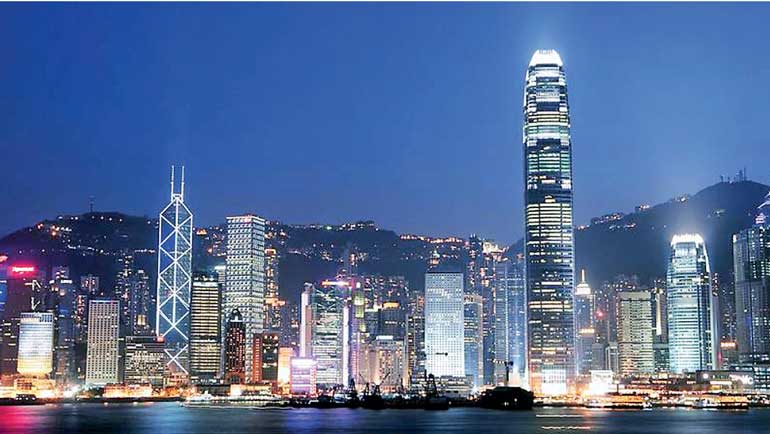Monday Feb 16, 2026
Monday Feb 16, 2026
Saturday, 29 October 2022 00:05 - - {{hitsCtrl.values.hits}}

China stresses reliance on its own efforts to drive the nation’s development, follows the path of peaceful development, and adopts a clear-cut position that it will always stand on the right side of history and the side of human progress
 On 16 October, the 20th National Congress of the Communist Party of China (CPC) opened in Beijing. I was honoured to join with leaders and representatives of 13 Sri Lankan political parties both from government and opposition, as well as five China-Sri Lanka friendship organisations, to watch the opening session and listen to the report delivered by Xi Jinping General Secretary of the CPC Central Committee together.
On 16 October, the 20th National Congress of the Communist Party of China (CPC) opened in Beijing. I was honoured to join with leaders and representatives of 13 Sri Lankan political parties both from government and opposition, as well as five China-Sri Lanka friendship organisations, to watch the opening session and listen to the report delivered by Xi Jinping General Secretary of the CPC Central Committee together.
In the report, General Secretary Xi Jinping proudly declared, “From this day forward, the central task of the CPC will be to lead the Chinese people of all ethnic groups in a concerted effort to realize the Second Centenary Goal of building China into a great modern socialist country in all respects and to advance the rejuvenation of the Chinese nation on all fronts through a Chinese path to modernization.” This solemn declaration resounded throughout the land of China and lifted the spirits of 1.4 billion Chinese people. “Chinese modernization” has soon become a hot topic attracting attention of not only friends in Sri Lanka, but also the international community.
How to understand Chinese modernisation?
Since modern times, achieving modernisation has become a common goal of all countries. Statesmen, scholars and citizens from different countries never quit thinking about these questions: What kind of modernisation to strive for? How to achieve the goal of modernisation? Is there an identical modernisation formula for all?
The Chinese communists have spent more than a century in exploring its own path to modernisation with unremitting endeavour from generation to generation – from the “four modernisations” slogan launched after the founding of the People’s Republic of China in 1949, referring to agriculture, industry, defence and science modernisation, to the “three-step strategy” for modernisation proposed after the beginning of reform and opening up in 1978. As socialism with Chinese characteristics entered a new era 10 years ago, General Secretary Xi Jinping pointed out, “We have upheld and developed socialism with Chinese characteristics and driven coordinated progress in material, political, cultural-ethical, social, and ecological terms, pioneered a new and unique Chinese path to modernisation, and created a new model for human advancement.” The CPC has led the Chinese people in forging ahead with the times and achieving fruitful theoretical and practical results in its modernisation drive.
Chinese modernisation is socialist modernisation pursued under the leadership of the CPC. It contains elements that are common to the modernisation processes of all countries, but more characterised by features that are unique to the Chinese context in five aspects: a modernisation of a huge population, of common prosperity for all, of material and cultural-ethical advancement, of harmony between humanity and nature, and of peaceful development. Chinese modernisation also has following eight essential requirements: 1) Upholding the leadership of the CPC and socialism with Chinese characteristics, 2) Pursuing high-quality development, 3) Developing whole-process people’s democracy, 4) Enriching the people’s cultural lives, 5) Achieving common prosperity for all, 6) Promoting harmony between humanity and nature, 7) Building a community with a shared future for mankind, and 8) Creating a new form of human advancement.
Chinese modernisation is neither a copy of the socialist practice in other countries, nor a copy of the Western model of modernisation. It is based on China’s fine traditional culture that adapts Marxism to the Chinese context, thus conforming to the global trends and the laws underlying the evolution of human society. This path of modernisation created by the CPC sets the direction for advancing the rejuvenation of the Chinese nation on all fronts.
What’s the global significance of Chinese modernisation?
Today’s world has entered a new phase of turbulence, transformation and profound changes unseen in a century. As governance, trust, development and peace deficits facing humanity continue to grow, changes of the world, of our times and of history are unfolding in ways like never before. In response to the question of our age, namely, “What has happened to the world, and how should we respond?” China has provided its own answer for the world.
Chinese modernisation will further contribute to world prosperity. In achieving modernisation, China has eradicated absolute poverty as scheduled and finished building a moderately prosperous society in all respects, thus attaining the First Centenary Goal, and significantly raised the overall performance of development of human society. Following the path of Chinese modernisation, China will continue to promote the gains of development to benefit all its people in a fair way, and enhance people’s sense of fulfilment, happiness and security. Both people’s material and cultural-ethical lives will be enhanced. China will also provide more quality ecological goods to promote harmony between humanity and nature. The modernisation of China’s 1.4 billion population, which is larger than the combination of all developed countries, is itself a pioneering work shining in human history. China, advancing along its path of modernisation, will absolutely bring more benefits to the world while achieving its own development.
Chinese modernisation will inspire more countries to pursue its own development path. China’s practices and achievements have proved that there is no patent or one-size-fits-all model of modernisation, thus successfully breaking the monopoly of Western countries in this field. All roads lead to modernisation. Every country should independently pursue modernisation through a path that is suited to its own history and conditions. Chinese modernisation has overcome the dilemma of Western model of modernisation and solved many difficulties facing the development of human society. It offers a new option for other countries and nations that want to speed up their development while preserving their independence; and it shares Chinese wisdom and a Chinese approach for mankind to explore the path of modernisation.
Chinese modernisation will further improve global governance. China abandons the Western path of modernisation that is capital-centred, polarised, full of materialism, expansion and pillage, and it will never go down the beaten track of big powers seeking hegemony or war. China stresses reliance on its own efforts to drive the nation’s development, follows the path of peaceful development, and adopts a clear-cut position that it will always stand on the right side of history and the side of human progress.
General Secretary Xi’s report has made “building a community with a shared future for mankind and creating a new form of human advancement” essential requirements of Chinese modernisation, which demonstrates that China, while pursuing its modernisation drive, will remain committed to promoting the development of global governance in a fairer, more just and more reasonable direction, and inject strong positive energy into world peace and development.
This year marks the 65th anniversary of diplomatic relations between China and Sri Lanka, and the 70th anniversary of the Rice-Rubber Pact. We welcome all Sri Lankan friends to board the express train of Chinese modernisation, and keep forging ahead towards national development and rejuvenation, and a better future of all mankind!
(The writer is the Ambassador of China to Sri Lanka.)